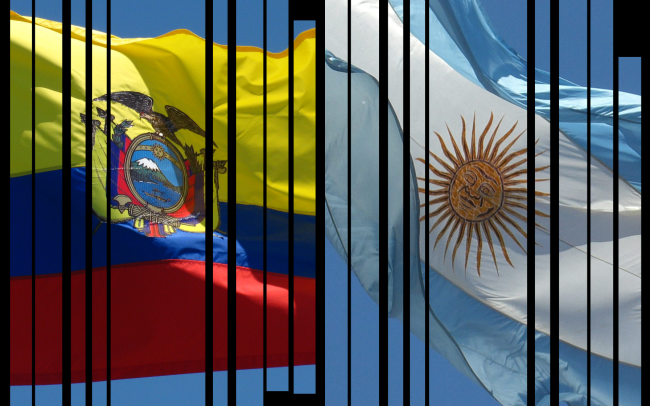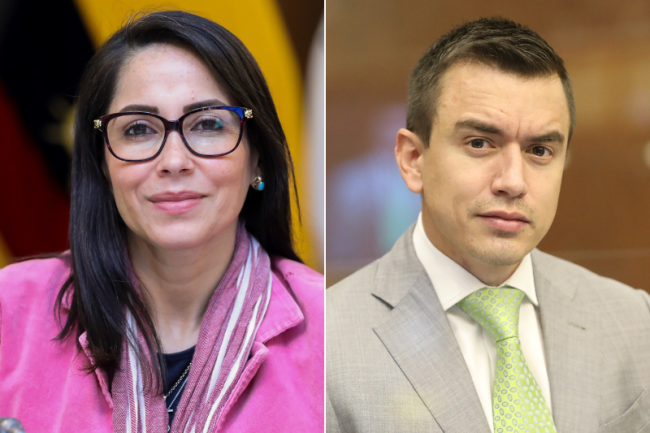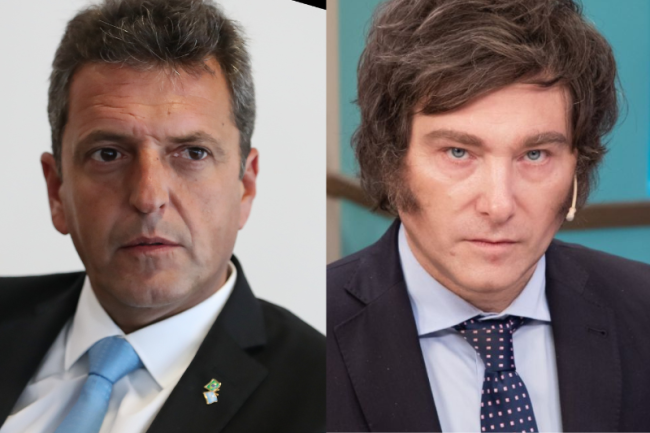
Leer este artículo en español.
With the victories in the last three years of various leftist candidates—in Chile, Argentina, Brazil, Colombia, Honduras, Peru, and Guatemala—Latin America has experienced a political shift that spans almost the entire continent. The “right turn” that began at the end of 2015 with the triumph of former president Mauricio Macri in Argentina and became radicalized since the administration of President Donald Trump came to an end faster than expected.
However, the recent experiences of Ecuador and Argentina point toward opposite poles, generating a bittersweet taste for the Left in regards to these events.
In Ecuador, for the second time in a row, a conservative candidate has become president, delivering a defeat to Correísmo. In Argentina, the victory of Peronismo in the first round has stopped the rise of the far-right candidate for now.
With these two results, it seems that there is no longer a one-way street for the Left in the region. The dispute is closer. The right-left pendulum swings dizzyingly. We are not heading inevitably toward the consolidation of leftist hegemonies as it seemed in the first progressive wave that lasted from the beginning of the century until well into the second decade, but rather toward seesawing processes, because radical neoconservatism has positioned itself and is on the rise.
But the partial defeats of the national-popular political movements do not mean their extinction—quite the contrary.
Ecuador: Conservatism Triumphs
In the case of the presidential elections in Ecuador, which took place in mid-October, the Movimiento Revolución Ciudadana party, led by former president Rafael Correa, repeated the results of the 2021 presidential elections. In those elections, the candidate Andrés Arauz achieved 32 percent in the first round and 47 percent in the second, defeated by President Guillermo Lasso. In this year's early elections, Correista candidate Luisa González, with Araúz as her running mate, achieved a very similar level of support: 33 percent in the first round and 48 in the second. The winner was conservative businessman Daniel Noboa, the youngest elected president in Ecuador’s history.
The defeat of Correísmo is surprising because Ecuador is concluding the unhappy experience of right-wing president Lasso’s term, characterized by corruption scandals, links of relatives and friends to drug trafficking, structural adjustment measures that sparked popular protests, and the excessive growth of criminal violence. When the incumbent president was on the verge of being impeached barely two years into his term, he opted to call early elections and step aside.
The results of Correísmo in the last two presidential elections mean, on the one hand, that Correísmo has a base level of social recognition. It is by far the most important progressive movement in the fight against conservatism. On the other hand, the results also mean that Correísmo has a ceiling and is unable to articulate and conquer new voters and support bases. It is also unable to rebuild its relationship with the Indigenous movement and to reconnect with young people and new political tendencies, especially active on social media. All of these are key factors in building new social majorities that would allow Correísmo to win electorally.
Therefore, Correísmo continues to dominate Ecuadorian progressive politics, but in and of itself the movement is not enough to secure a progressive turn and remake the political hegemony it managed to achieve from 2007 to 2017 during Correa's terms in office. In other words, without Correa, progressivism is very weak, but with Correa only, it cannot win.
The internal crisis of Correísmo after this second consecutive defeat shows that the movement will have to redefine its relations and its internal structure in order to open a dialogue with the Indigenous and youth sectors, and thus seize the new presidential elections that will take place in just a year and a half.
This experience is an example for Latin America of the limitations of progressive movements to grow in the current circumstances. Today, there is less ideological diatribe. The vote of young people who did not live through the first progressive cycle, who therefore do not vote out of remembrance of the past—as Luisa González's campaign proposed—plays a role. Additionally, political movements have to adapt new communication strategies that involve codifying political messages according to the norms of social media and in ways that resonate with a younger electorate disinterested in traditional politics.

Milei: A "Lion" No Longer So Brave
In Argentina, the surprise occurred in the opposite direction. The rise of the extreme right of self-proclaimed “lion” Javier Milei was believed to be unstoppable. In the open, simultaneous, and mandatory primaries, known as PASO, that occurred in August, Milei achieved 30 percent of the votes. His rise was presented as meteoric, especially due to the inflationary crisis that the Peronist government has not been able to control, for which the presidential candidate and current Minister of Economy Sergio Massa himself is mainly responsible.
Peronism, which obtained 21 percent in the PASO, showed its weakest side, ending up in a risky situation on the verge of not making it to the second round for the first time in its history.
But with the first round on October 22, the scenario has changed tremendously. Peronism, as it has demonstrated on many occasions, has the capacity to reinvent and redefine itself according to each electoral situation. We have previously seen how Peronism can dress up as the neoliberal right, as with former President Carlos Menen between 1989 and 1999; as the radical left, as during Kirchnerism from 2003 to 2015; or as a reformist movement, depending on the political trend of the moment. In the case of Massa, Peronism bet on a moderate actor, who has demonstrated his ability to connect with the most disadvantaged sectors, engage different sectors and voters, and, with this, stop the rise of Milei.
Massa obtained 37 percent while Milei came in second with 30 percent. Conservative former security minister Patricia Bullrich finished in third place with 23 percent.
Peronism managed to recover and in a matter of weeks it is now the main political force in the country. Regardless of the result in the second round, Peronism will have a significant weight in Argentine institutional development when just a few weeks ago many projected its dissolution.
Milei's radical right now understands that, even if he wins, his movement will have to coexist with Peronism, and in just two years it will have to endure a midterm election with the historic movement doing what it knows how to do best: political stalking. During its long trajectory since 1945, Peronism has only lost three presidential elections—in 1983, 1999, and 2015—and has won 10. It is a sociopolitical organization that has survived the cruelest dictatorships and is always ready to change the correlation of forces in any scenario.
For his part, Milei has had to dismantle his radical right-wing discourse and concern himself with disavowing the elimination of social policies, as he proposed in the first round campaign.

Correísmo and Peronism at a Crossroads
Leftist governments, all facing fierce opposition and the risk of losing the next presidential elections, must conduct a careful analysis of these results from Ecuador and Argentina. Stopping the advance of this new radicalized right is the primary objective.
These recent results lay bare two totally different concepts. One—Peronism—was capable of moving much faster in the ideological field to achieve a regrouping of relevant social groups. The other—Correísmo—had a hard time renewing its approaches in order to continue its hegemonic run, and has tended towards stagnation.
The results of the first round in Argentina represent a breath of fresh air for the progressive world concerning precise strategies to stop the advance of the extreme right. We are talking about a radical, populist right that sees itself as the enemy of any social program and promises persecution and criminalization of progressive forces, unceremoniously embracing the most extreme conservative agenda. Milei’s partial defeat is a way for the Left to feel strengthened because it begins to grasp the limitations of these discourses and can better position itself when it comes to counter attacking, as Peronism has done.
But at the same time, conservatism can also assess its own barriers, its own ceilings. The Right will be forced to moderate its ideological discourse and begin to contemplate the working class and the logic of the national movements whose empowerment surprises them. In the case of Noboa, he knew how to wield a fresh, youthful, non-polarizing, moderate discourse. Milei has been forced by the circumstances of the result of the first round to try a new, much more moderate scheme.
Both winners, Noboa and Massa, achieved victory by turning towards the center. While the losers, Milei and González, have tied themselves to their most intransigent positions.
To continue winning presidential elections, left-wing sectors will have to moderate their expectations, which jeopardizes the transformational policies that they have proposed in their respective campaigns. It is a journey towards the center, trying not to die in the attempt.
Will the Left pull it off? We will see the first answer on November 19, the day of the runoff that will define the course of Argentina. In the Ecuadorian case, we will have to wait a year and a half, until the next presidential elections.
Ociel Alí López is a sociologist, winner of the Clacso/Sida awards for young researchers and the Caracas municipal literature award. He is a professor at the Central University of Venezuela and writes about Latin America.

